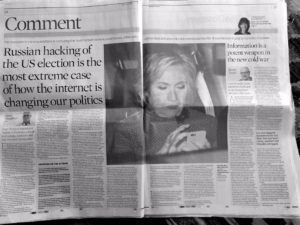This morning’s Observer column:
When WhatsApp, the messaging app, launched in 2009, it struck me as one of the most interesting innovations I’d seen in ages – for two reasons. The first was that it seemed beautifully designed from the outset: it was clean, minimalist and efficient; and, secondly, it had a business model that did not depend on advertising. Instead, users got a year free, after which they paid a modest annual subscription.
Better still, the co-founder Jan Koum, seemed to have a very healthy aversion to the surveillance capitalism that underpins the vast revenues of Google, Facebook and co, in which they extract users’ personal data without paying for it, and then refine and sell it to advertisers…
Ah yes. That was then. But now…

